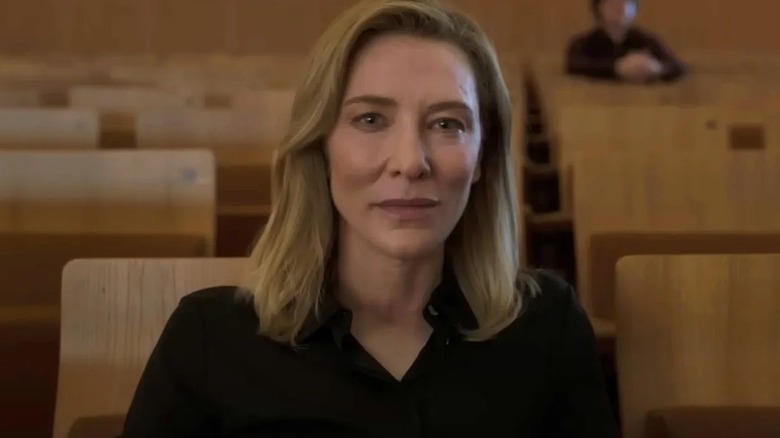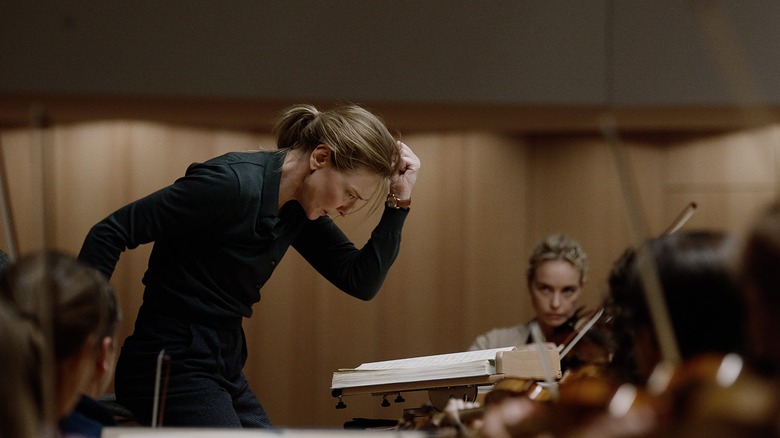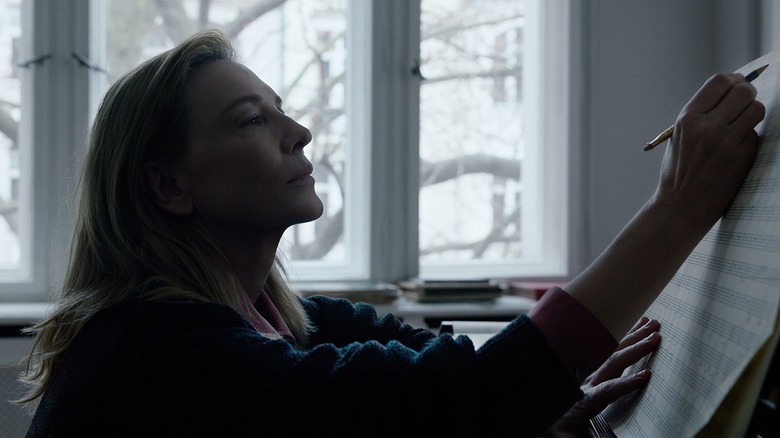A Tar Deleted Scene Would Have Provided Insight Into Lydia Tar's Relationship With Her Mother
This post contains spoilers for Todd Field's film "Tár."
The title character of "Tár" holds a dark secret, and yet the character is not necessarily mysterious. Lydia Tár (Cate Blanchett) is undeniably skilled, genuinely important, and widely celebrated in the classical music world; she is even, in the film's lore, an EGOT. Throughout Field's movie, though, a quiet story begins to unfold around the fate of Tár's former protégé, an off-screen character named Krista. The audiences will eventually learn that Lydia might have been having a not-entirely-secret affair with Krista — her assistant Francesca (Noémie Merlant) seems to know all about it — and that Lydia might have used her vaunted position to leverage Krista's silence on the matter, leading to tragedy and potential legal action.
Given how forthright she is about covering up her relationship with Krista, audiences can see that, in addition to her intelligence and devotion to art and to class, Lydia is a mercenary soul. At one point in the film, when dropping her daughter off at school, Lydia takes a few moments to threaten violence on one of her daughter's bullying young classmates. Later still, audiences finally learn why Lydia is so devoted to staying in the world of high art: She had to fight her way in.
In a telling sequence, Lydia hides out in her childhood home, a small, run-down, cramped home outside of town. There, old newspaper clips reveal that her name isn't actually Lydia Tár. She has spent her life putting up a façade of class. Having been corrupted by fame, her appetites now threaten to return her to a world she seems to have deliberately and spitefully fled — a matter one of the film's deleted scenes examined in greater detail.
Lydia's mother
As part of Variety's video series "Actors on Actors," Cate Blanchett sat down with Michelle Yeoh to discuss their respective work on "Tár" and "Everything Everywhere All at Once." In the interview, Blanchett revealed that there was additional backstory for her character. She ran down Lydia quite succinctly first, saying:
"Todd Field — who wrote and directed the film — he didn't want an audience to have too much access to her. What was my friend was: as conductors, as maestros, your persona often cements your reputation. If you're a glass of water, people have nothing to talk about [...] You think about the great conductors, and their personality is always talked about. Their style is always talked about."
Blanchett, of course, played Lydia as being strong-willed and well-defined, while still feeling somewhat adrift. It's a credit to Blanchett that she so successfully created a character like Lydia who can be both a well-defined and strong orchestra conductor, while also given to vices and bad behavior. She is, in short, a complete character.
The sequences in Lydia's childhood home are telling, but Field filmed a version of "Tár" that went even further. In an early cut of the film, Lydia's mother would play a key role in revealing who she was.
Tár's mom
A big part of Lydia's character was, according to Cate Blanchett, her age. In the film, the character is about to turn 50, and an element of midlife crisis seems to be at play. Blanchett described a birthday party scene that was removed from the film, as well as the introduction of a vital new character: Lydia's mother. Blanchett explained:
"There used to be a huge birthday party sequence — I'm sort of loathe to talk about it, really — but there was sequence where her mother came to a book launch [...] I think they did have quite a moving relationship, though there's a lot of guilt there because her mother was deaf. [Lydia] has misophonia, so she has an acute sensitivity to sound. Her hearing is so excellent that it's almost an impediment to her being socially functional. And yet her parents are deaf."
That detail, it seems, was too much for an already long movie — "Tár" runs 158 minutes — and was cut for time. Audiences may not have known those specific detail about Lydia's parents, but Blanchett used it as "ammunition" regardless:
"And so I thought 'Wow, what was her schooltime like? What was she running from?' And of course that scene didn't make the movie [...] At the time it came in, you couldn't tell that part of the story. It wasn't an eight-part miniseries. It was about something deeper than any of the characters, I think. Yet I knew it. So I think in terms of what drove her, I think she's running from a lot of stuff."
Blanchett certainly gave Lydia her humanity, refusing to see her as a mere collection of complexes. It's one of the better performances in one of the year's better films.


